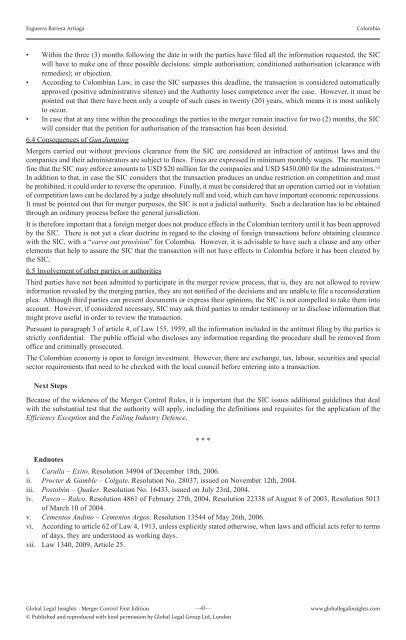Merger Controls First Edition - J Sagar Associates
Merger Controls First Edition - J Sagar Associates
Merger Controls First Edition - J Sagar Associates
Create successful ePaper yourself
Turn your PDF publications into a flip-book with our unique Google optimized e-Paper software.
Esguerra Barrera Arriaga Colombia<br />
• Within the three (3) months following the date in with the parties have filed all the information requested, the SIC<br />
will have to make one of three possible decisions: simple authorisation; conditioned authorisation (clearance with<br />
remedies); or objection.<br />
• According to Colombian Law, in case the SIC surpasses this deadline, the transaction is considered automatically<br />
approved (positive administrative silence) and the Authority loses competence over the case. However, it must be<br />
pointed out that there have been only a couple of such cases in twenty (20) years, which means it is most unlikely<br />
to occur.<br />
• In case that at any time within the proceedings the parties to the merger remain inactive for two (2) months, the SIC<br />
will consider that the petition for authorisation of the transaction has been desisted.<br />
6.4 Consequences of Gun Jumping<br />
<strong>Merger</strong>s carried out without previous clearance from the SIC are considered an infraction of antitrust laws and the<br />
companies and their administrators are subject to fines. Fines are expressed in minimum monthly wages. The maximum<br />
fine that the SIC may enforce amounts to USD $20 million for the companies and USD $450,000 for the administrators. vii<br />
In addition to that, in case the SIC considers that the transaction produces an undue restriction on competition and must<br />
be prohibited, it could order to reverse the operation. Finally, it must be considered that an operation carried out in violation<br />
of competition laws can be declared by a judge absolutely null and void, which can have important economic repercussions.<br />
It must be pointed out that for merger purposes, the SIC is not a judicial authority. Such a declaration has to be obtained<br />
through an ordinary process before the general jurisdiction.<br />
It is therefore important that a foreign merger does not produce effects in the Colombian territory until it has been approved<br />
by the SIC. There is not yet a clear doctrine in regard to the closing of foreign transactions before obtaining clearance<br />
with the SIC, with a “carve out provision” for Colombia. However, it is advisable to have such a clause and any other<br />
elements that help to assure the SIC that the transaction will not have effects in Colombia before it has been cleared by<br />
the SIC.<br />
6.5 Involvement of other parties or authorities<br />
Third parties have not been admitted to participate in the merger review process, that is, they are not allowed to review<br />
information revealed by the merging parties, they are not notified of the decisions and are unable to file a reconsideration<br />
plea. Although third parties can present documents or express their opinions, the SIC is not compelled to take them into<br />
account. However, if considered necessary, SIC may ask third parties to render testimony or to disclose information that<br />
might prove useful in order to review the transaction.<br />
Pursuant to paragraph 3 of article 4, of Law 155, 1959, all the information included in the antitrust filing by the parties is<br />
strictly confidential. The public official who discloses any information regarding the procedure shall be removed from<br />
office and criminally prosecuted.<br />
The Colombian economy is open to foreign investment. However, there are exchange, tax, labour, securities and special<br />
sector requirements that need to be checked with the local council before entering into a transaction.<br />
Next Steps<br />
Because of the wideness of the <strong>Merger</strong> Control Rules, it is important that the SIC issues additional guidelines that deal<br />
with the substantial test that the authority will apply, including the definitions and requisites for the application of the<br />
Efficiency Exception and the Failing Industry Defence.<br />
* * *<br />
i.<br />
Endnotes<br />
Carulla – Exito. Resolution 34904 of December 18th, 2006.<br />
ii. Procter & Gamble – Colgate. Resolution No. 28037, issued on November 12th, 2004.<br />
iii. Postobón – Quaker. Resolution No. 16433, issued on July 23rd, 2004.<br />
iv. Pavco – Ralco. Resolution 4861 of February 27th, 2004, Resolution 22338 of August 8 of 2003, Resolution 5013<br />
of March 10 of 2004.<br />
v. Cementos Andino – Cementos Argos. Resolution 13544 of May 26th, 2006.<br />
vi. According to article 62 of Law 4, 1913, unless explicitly stated otherwise, when laws and official acts refer to terms<br />
of days, they are understood as working days.<br />
vii. Law 1340, 2009, Article 25.<br />
Global Legal Insights <strong>Merger</strong> Control <strong>First</strong> <strong>Edition</strong><br />
—43—<br />
© Published and reproduced with kind permission by Global Legal Group Ltd, London<br />
www.globallegalinsights.com


